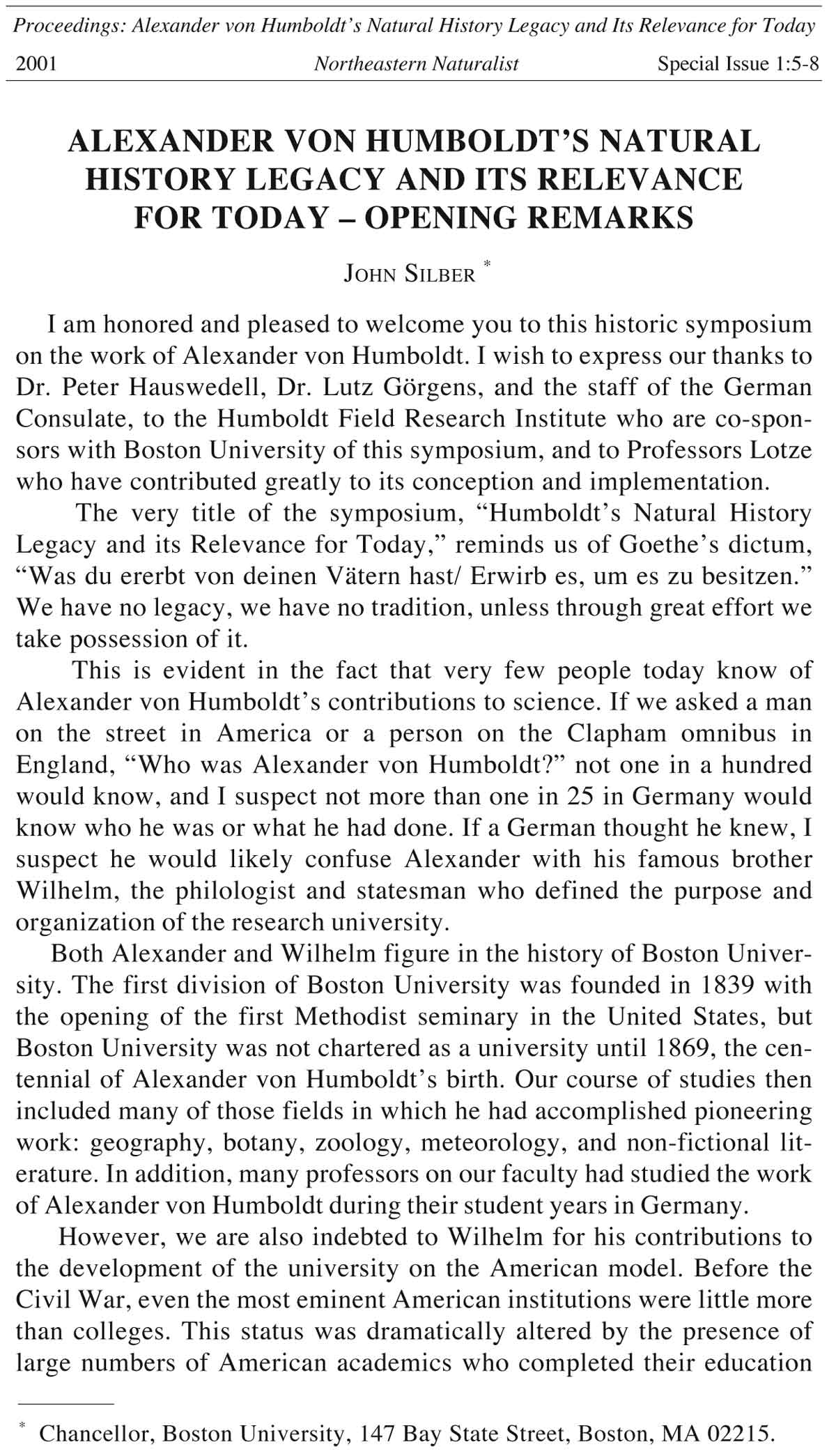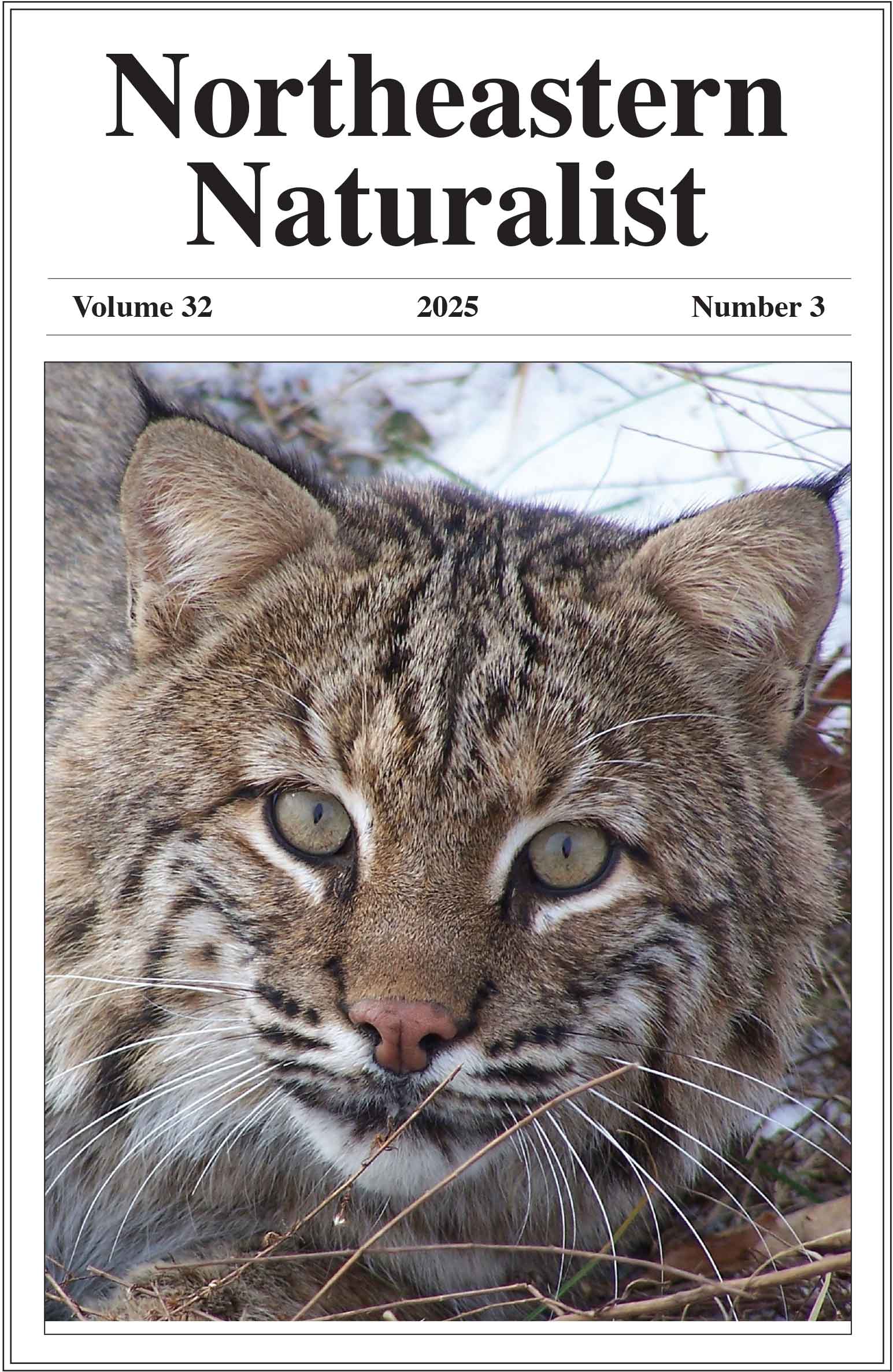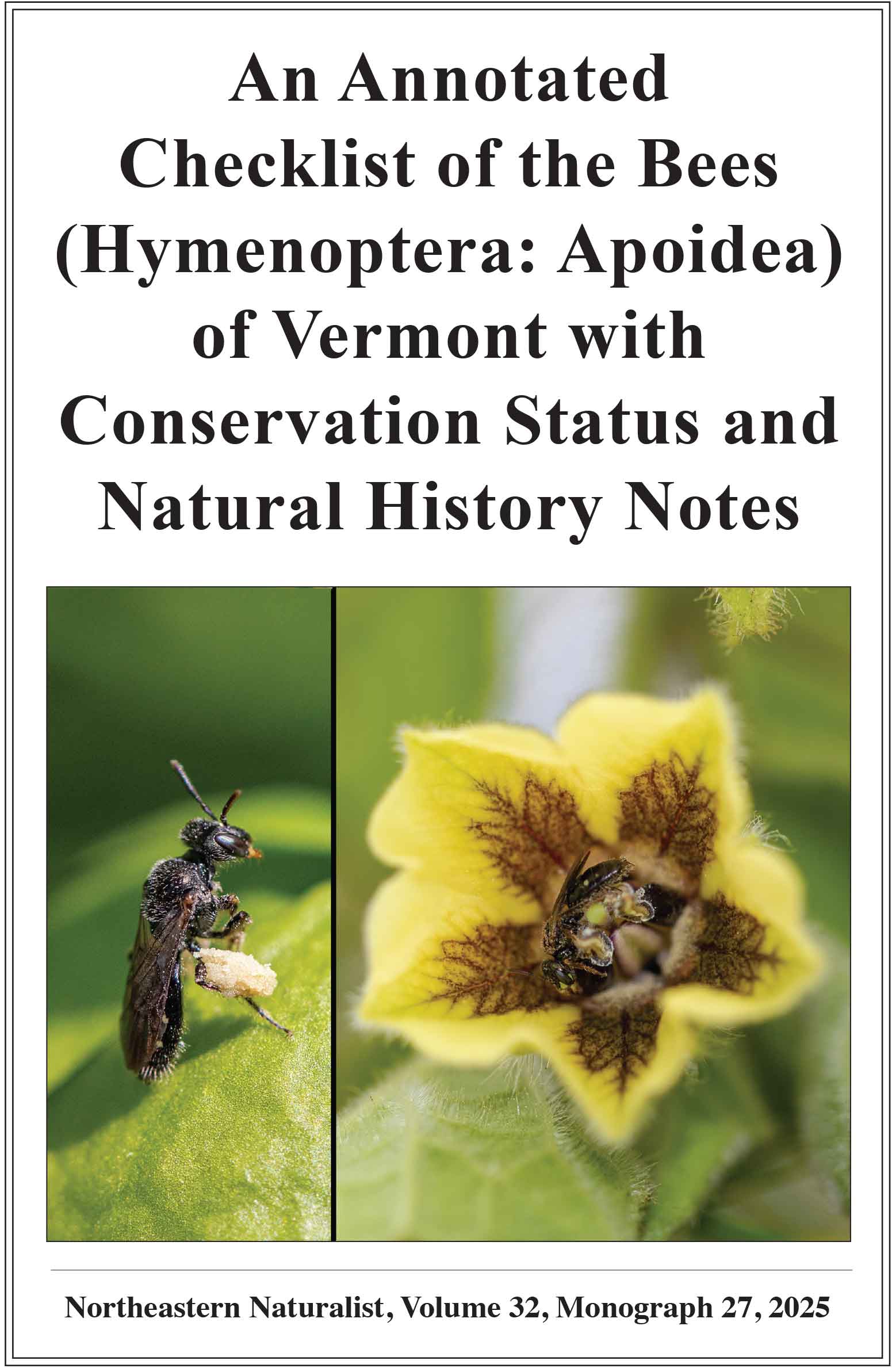Proceedings: Alexander von Humboldt’s Natural History Legacy and Its Relevance for Today
2001 Northeastern Naturalist Special Issue 1:5-8
ALEXANDER VON HUMBOLDT’S NATURAL
HISTORY LEGACY AND ITS RELEVANCE
FOR TODAY – OPENING REMARKS
JOHN SILBER *
I am honored and pleased to welcome you to this historic symposium
on the work of Alexander von Humboldt. I wish to express our thanks to
Dr. Peter Hauswedell, Dr. Lutz Görgens, and the staff of the German
Consulate, to the Humboldt Field Research Institute who are co-sponsors
with Boston University of this symposium, and to Professors Lotze
who have contributed greatly to its conception and implementation.
The very title of the symposium, “Humboldt’s Natural History
Legacy and its Relevance for Today,” reminds us of Goethe’s dictum,
“Was du ererbt von deinen Vätern hast/ Erwirb es, um es zu besitzen.”
We have no legacy, we have no tradition, unless through great effort we
take possession of it.
This is evident in the fact that very few people today know of
Alexander von Humboldt’s contributions to science. If we asked a man
on the street in America or a person on the Clapham omnibus in
England, “Who was Alexander von Humboldt?” not one in a hundred
would know, and I suspect not more than one in 25 in Germany would
know who he was or what he had done. If a German thought he knew, I
suspect he would likely confuse Alexander with his famous brother
Wilhelm, the philologist and statesman who defined the purpose and
organization of the research university.
Both Alexander and Wilhelm figure in the history of Boston University.
The first division of Boston University was founded in 1839 with
the opening of the first Methodist seminary in the United States, but
Boston University was not chartered as a university until 1869, the centennial
of Alexander von Humboldt’s birth. Our course of studies then
included many of those fields in which he had accomplished pioneering
work: geography, botany, zoology, meteorology, and non-fictional literature.
In addition, many professors on our faculty had studied the work
of Alexander von Humboldt during their student years in Germany.
However, we are also indebted to Wilhelm for his contributions to
the development of the university on the American model. Before the
Civil War, even the most eminent American institutions were little more
than colleges. This status was dramatically altered by the presence of
large numbers of American academics who completed their education
* Chancellor, Boston University, 147 Bay State Street, Boston, MA 02215.
6 Northeastern Naturalist Special Issue 1
by advanced study in Germany. There they found educational institutions
developed on the Humboldtian model, institutions of a complexity
and rationality of organization for which there were few if any parallels
in the United States or in England.
Some American scholars were determined to return home and establish
institutions of higher learning that would try to emulate the comprehensive,
graduate-level research and teaching of the Humboldtian university
while maintaining a concern for undergraduate education that
was typical of the American college.
Among these American scholars who returned home from Germany
driven by a vision of a new kind of university was William Fairfield
Warren, the founding president of Boston University. He has, in my
mind, been somewhat unfairly eclipsed by the reputations of his colleagues
and contemporaries Charles W. Eliot of Harvard, Andrew
Dickson White of Cornell, and Daniel Coit Gilman of Johns Hopkins.
None of these distinguished figures was ahead of Dr. Warren in adapting
the Humboldtian model of the university to the United States by grafting
the German university onto the American college. By 1874, Boston
University numbered five schools and colleges—graduate and undergraduate
schools of liberal arts, theology, law, and medicine. Warren at
this point was abreast of Dr. Eliot at Harvard and ahead of White at
Cornell. Gilman was not to begin his work at Johns Hopkins until its
founding two years later.
At Boston University we are very much aware of our debt to both
Alexander and Wilhelm von Humboldt and the German university.
Indeed, if Goethe had written Faust on the basis of experience at Boston
University (or any other American research university), he would still
have Faust declare,
Habe nun ach Philosophie
Juristerei und Medizin
Und leider auch Theologie
Durchaus studiert ...
(Faust, Erster Teil, ll. 354-357)
Although I have welcomed more than a hundred symposia to Boston
University over the last quarter-century, it is only on the rarest occasions
that I have been privileged to open a symposium with such a diverse and
superbly qualified list of participants. It is, in fact, a tribute to Alexander
von Humboldt’s enormous, indeed unlimited, range of interests that we
must include among our participants experts in glacial and Quaternary
geology; scientific literature, history, and biography; botany and zoology;
tropical, insect, behavioral, and landscape ecology; and physical,
plant, and cultural geography. Although Alexander had little appreciation
for music, one participant is in fact a remarkable musician and biologist.
2001 J. Silber 7
It is particularly appropriate that our list of participants includes
Loren McIntyre, an explorer, who will deliver the keynote address. His
inclusion is of particular importance, for Alexander von Humboldt was
a tireless explorer and adventurer of the intensity, determination, and
perseverance of Richard Burton, with whom von Humboldt shared an
interest in tracing uncharted rivers to their source. Like Burton, he was a
man of enormous physical strength and endurance. Most importantly,
perhaps, he must have had an incomparably powerful immune system to
have come through all the ordeals of his adventures in the jungles of
South America without having succumbed to typhoid, yellow fever, or
dozens of other tropical diseases to which he was exposed and which
frequently laid low his partner, the biologist Aimé Bonpland. Alexander
von Humboldt could withstand the intense tropical heat and humidity of
the jungle lowlands and the bitter cold of the high Andes.
He and his brother were remarkable in their differences. Wilhelm
had a powerful intellectual center and a relatively limited circumference
of interests. Alexander had an intellectual circumference without limit,
for nothing in the universe was alien to his interests. Wilhelm, with the
sibling rivalry of an older brother, might remark on his shallowness, but
all who met Alexander marveled at his comprehensive knowledge of an
almost unlimited range of subjects.
Both brothers had in common extraordinary intelligence, a gift for and
command of many languages, and diplomatic skills of the highest order.
The Kings of Spain and Prussia, the Czar of Russia, and the President of
the United States were all deeply impressed by Alexander von Humboldt.
President Kennedy, in the 1960s at a gathering of intellectuals in the
White House, remarked, “I think this is the most extraordinary collection
of talent, of human knowledge, that has ever been gathered together in the
White House—with the possible exception of when Thomas Jefferson
dined alone.” He could have said, with equal truth, that there had never
been so much intelligence and learning in the White House since President
Jefferson gave Alexander von Humboldt the run of the place in
1804. He occupied a position in public esteem in the nineteenth century at
least comparable to that of Einstein in the twentieth century.
It is difficult to imagine a more complex or intriguing figure for
examination and discussion than the subject of this symposium. Von
Humboldt’s vitality, both mental and physical, enabled him at age 60 to
accept a commission from the Czar of Russia to examine the gold mines
in the Ural Mountains, an assignment which carried him over 11,000
miles to the very borders of China. And from ages 65 to 89 he wrote his
five-volume treatise on the cosmos, in which he attempted to organize
all known knowledge of the material universe. Ludwig van Beethoven
was still writing quartets at the time that Alexander von Humboldt was
born. Kant had not yet presented his inaugural dissertation, and the
8 Northeastern Naturalist Special Issue 1
Critique of Pure Reason did not appear for another twelve years.
Alexander von Humboldt lived untill 1859, the year in which Darwin
published On the Origin of Species, a work for which Alexander von
Humboldt prepared the way.
On behalf of Boston University and its Center for Ecology and
Conservation Biology, I welcome you to this feast of learning.













 The Northeastern Naturalist is a peer-reviewed journal that covers all aspects of natural history within northeastern North America. We welcome research articles, summary review papers, and observational notes.
The Northeastern Naturalist is a peer-reviewed journal that covers all aspects of natural history within northeastern North America. We welcome research articles, summary review papers, and observational notes.